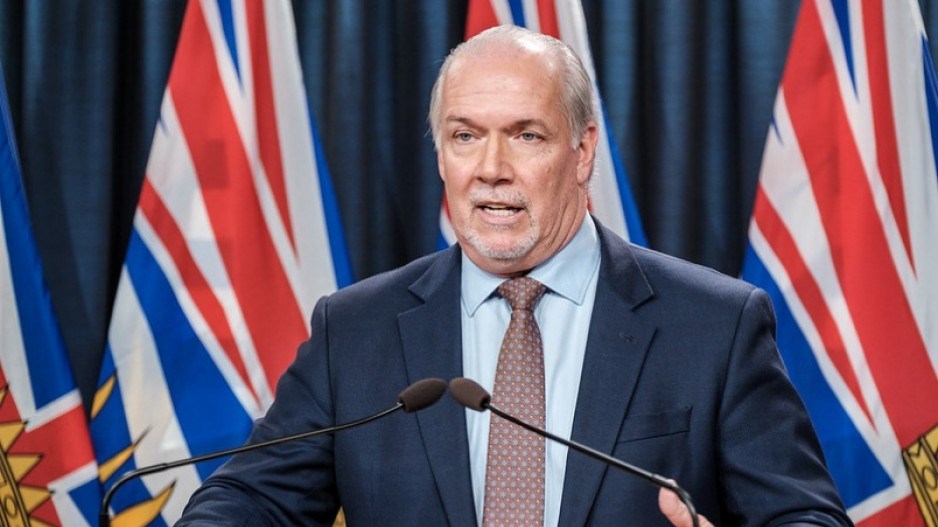Premier John Horgan is advising British Columbians to follow the federal government’s advice to avoid non-essential travel outside the country for now.
“As the highly transmissible Omicron variant spreads worldwide, this is not a time to take chances,” said Horgan.
Horgan, who is undergoing cancer treatment, said the advice will undoubtedly disrupt many holiday plans, but that a fast-changing and unpredictable situation demands using “caution and prudence.”
“We will get through this so we can once again enjoy all the holiday traditions,” the premier said in a statement.
Aside from avoiding non-essential international travel, the province is asking people to follow public health guidelines and book COVID-19 vaccinations, including booster shots.
B.C. Health Minister Adrian Dix said B.C. will consider capacity limits on large indoor events as COVID-19 cases rise, including the new Omicron variant, as Ontario announced it would do Wednesday.
Public health officers are meeting “and those issues are all under active consideration,” said Dix. “We’ll have more to say about that soon.”
Meanwhile, the B.C. General Employees’ Union applauded the province’s decision Wednesday to delay until at least Jan. 17 a return-to-office order for public servants and allow them to work from home where their jobs allow that.
“Our union has been urging government since early in the pandemic that they need to continue with flexible work arrangements until the province has moved to Step 4 [full re-opening],” said BCGEU president Stephanie Smith. The union is also calling on the government to reinstate capacity limits in all workplaces, particularly liquor and cannabis retail stores.”
Earlier Wednesday, the federal government warned against all non-essential international travel.
“Now is not the time to travel,” Health Minister Jean-Yves Duclos said at a news conference in Ottawa. “The rapid spread of the Omicron variant on a global scale makes us fear the worst for Canadians that may think of travelling.”
Duclos said the highly transmissible variant is spreading in Canadian communities, and just about everywhere else in the world. He said that people who leave the country risk spreading the virus, and getting stranded abroad.
“We know that this may sound very drastic,” Duclos said. “But we must avoid overloading our hospital system and our health-care workers.”
As B.C. reported 584 new cases of COVID-19 Wednesday, Dix noted the Omicron variant is spreading quickly, and is expected to soon become the dominant variant in Ontario. Roughly 700 of 1,900 new cases of COVID-19 reported in Ontario on Wednesday were Omicron.
“So whether you’re travelling around the world or across Canada, this is the time to exercise caution across the board,” said Dix.
Dix advised only gathering in small numbers with people you know who are vaccinated.
B.C. reported 109 new COVID-19 cases in Island Health on Wednesday for a total of 856 active cases; 39 people are hospitalized with COVID, 14 of them in critical care.
There were 44 reported cases of Omicron in B.C. on Tuesday. Dix said that number will be updated on Thursday and is expected to increase significantly.
As of Tuesday, 137 cases of COVID-19 on the Island were related to University of Victoria off-campus parties and the Canadian University Men’s Rugby Championship held Nov. 24-28 at Queen’s University in Kingston, Ont. and attended by the UVic Vikes men’s rugby team. Of the 137 cases, 15 were Omicron, Island Health said.
COVID modelling released Tuesday shows COVID-19 cases rising on Vancouver Island, driven by outbreaks at the University of Victoria and a religious gathering in the northern part of the Island.
Dix continued to defend on Wednesday the province’s booster program, first announced on Oct. 26, saying “significant progress” has been made.
Booster shots are now being offered by invitation to those 65 and older in B.C. six to eight months after second-dose vaccinations, with plans to offer them to the wider population in January.
B.C. prioritized third COVID-19 shots for people in long-term care, assisted and independent living, clinically extremely vulnerable people, rural and remote Indigenous communities, and health care workers. Health officials maintain a six- to eight- month interval between second and third doses increases immune response. Ontario, however, has said anyone age 18 and older is eligible for a third shot starting Monday because Omicron is spreading so rapidly.
As of Tuesday, 633,831 people in B.C. have received third doses — 45 per cent of people over age 70.
When British Columbians book their booster shots online they should see a drop-down menu offering third shots at about 350 pharmacies in 80 communities in B.C. As of Tuesday, 54 of those pharmacies are in 18 cities in the Island Health region.
— With The Canadian Press
> Book COVID-19 vaccination online at getvaccinated.gov.bc or phone 1-833-838-2323



